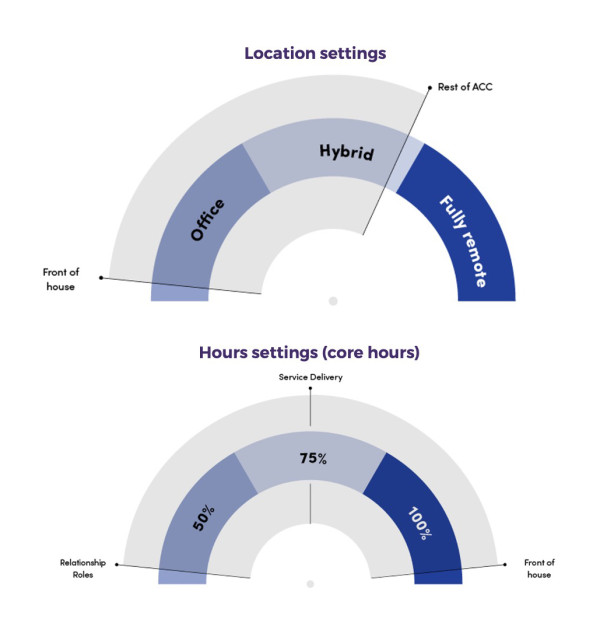-
Section 01
Introduction to hybrid working
-
Section 02
Hybrid working — the quick guide
-
Section 03
Considering your approach to hybrid working
-
Section 04
Hybrid working — all the detail
-
Appendix
Appendix A: Working overseas
-
Appendix
Appendix B: Model Team Charter
-
Appendix
Appendix C: Assessing the level of work to be done kanohi ki te kanohi
-
Appendix
Appendix D: How much work can be done from home or remotely?
-
Appendix
Appendix E: Setting expectations for hybrid work and the SMART model
-
Section 10
Appendix F: Hybrid working case study — ACC
-
Appendix
Appendix G: Further reading related to hybrid working
This guidance is currently being reviewed to ensure it aligns with Government expectations as announced on Monday 23 September.
This case study looks at how the Accident Compensation Corporation (ACC) developed its hybrid working approach.
About ACC
ACC is the Crown entity set up under the Accident Compensation Act 2001 to deliver New Zealand’s accident insurance scheme. The purpose of the ACC Scheme is to deliver injury prevention initiatives and no-fault personal injury cover for everyone in New Zealand. ACC employs almost 4,000 permanent and temporary staff across 30-plus locations.
Our context and the opportunity
In the early stages of the COVID-19 pandemic ACC rapidly adapted to support its people to work remotely and enable service delivery to continue. This began with a survey to understand its people’s needs in conjunction with a rapid rollout of mobile devices and other supports to enable effective remote working. Additionally, a wellbeing programme and check-in conversations were put in place to support employees.
At the beginning of 2022, ACC followed up these initial measures by asking employees about their experiences of working from home and sought to adapt the approach to make it more effective, engaging and enduring. It was clear that expectations about work had changed, and that ACC’s people wanted certainty about how flexibility and hybrid working would be approached into the future.
Starting the mahi: Hybrid working Phase 1
In early 2022, a working group developed the new approach, taking forward many of the measures adopted during COVID-19 and introducing additional resources and support.
Laying the foundation
After an initial consultation, ACC established four core role groupings based on the type of work performed. Role groupings were relationship or service delivery based, and either internally or externally focused. A fifth front-of-house role grouping was established due to those roles having unique face-to-face requirements. These role groupings provided a foundation from which further refinements to the approach could be made.
Rather than a prescriptive approach, the framework enabled leaders to find ‘best fit’ for their people, teams, and customers. As a starting point, ACC has offered up to three days of remote working for all employees (except those in front-of-house roles). ACC also offered flexibility in terms of hours worked. Under Phase 1, relationship roles work a minimum of 50% of the time during core hours, while for service delivery and front of house roles these numbers are 75% and 100% respectively.

Enabling the hybrid approach
ACC did not offer location and hours flexibility as entitlements. All decisions were made contingent on team, business, and customer requirements. Central to decision making was leaders bringing their teams together to discuss and agree hybrid working settings. ACC invested in tools and resources to enable leaders to have the right conversations with their teams, and for teams to confirm their commitments. ACC also deployed an online ‘Remote working declaration’, which confirmed health, safety, and privacy requirements for working remotely and provided data about take-up of hybrid working options at ACC.
Culture and connection
ACC asked its leaders to plan for connection with their teams to enable positive working relationships and get the most out of hybrid working. ACC’s approach acknowledged the importance of bringing people together both face to face and virtually through key connection points called ‘Moments that Matter’. ACC encouraged all employees to focus on behaviours important in a hybrid working culture, such as caring, collaboration and empowerment.
What is next for ACC
ACC’s most recent employee survey shows that employees appreciate the changes made and are looking forward to further refinements. The next opportunity is to look beyond the ‘when and where’ of work and start thinking about how work can be designed to improve what ACC offers to New Zealanders. Watch this space…